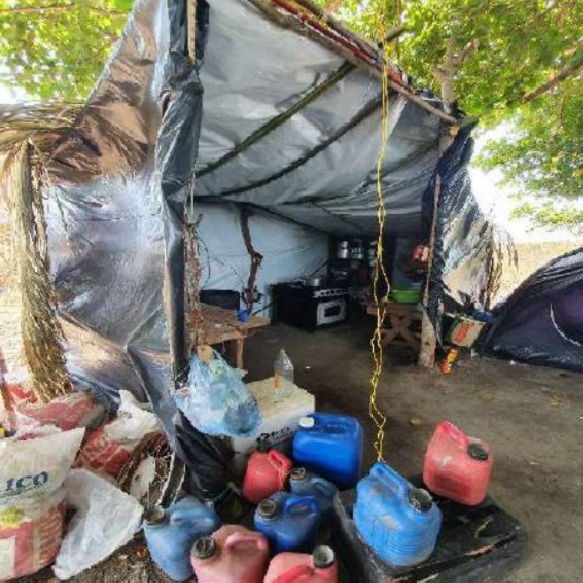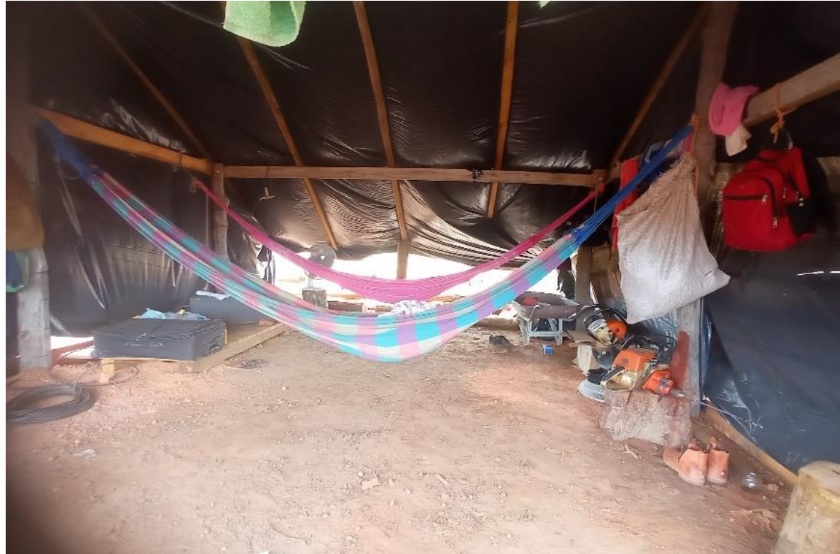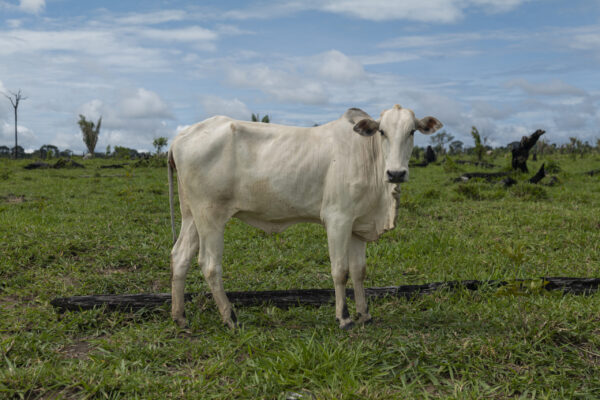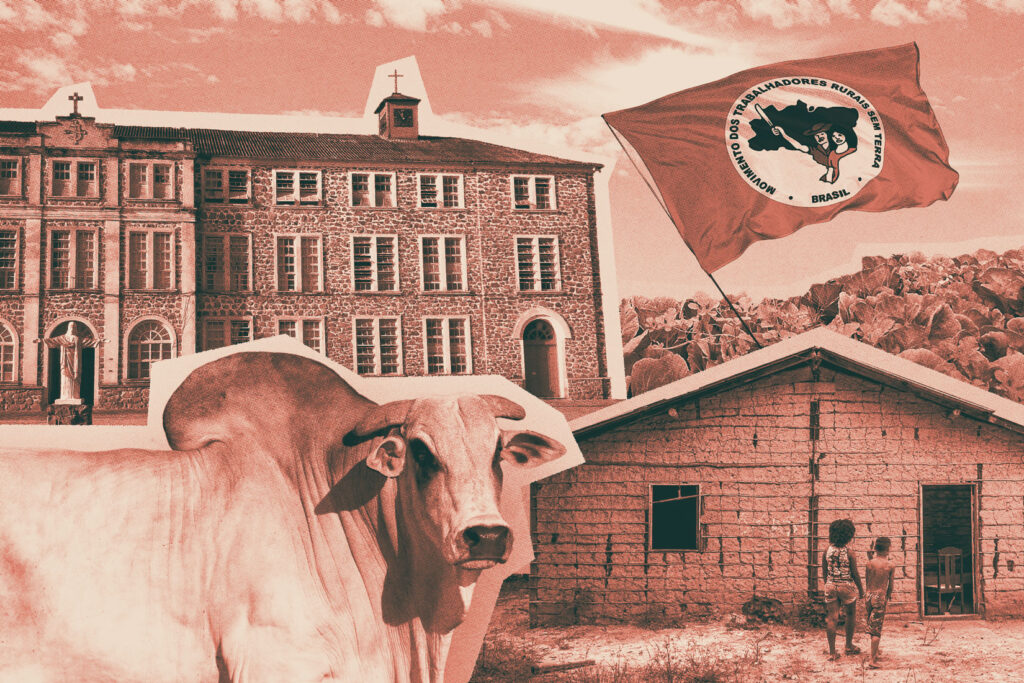THE SAUDI OIL GIANT ARAMCO acquired bovine tallow from a Brazilian meatpacker connected to a farm where authorities identified slave-like labor conditions. The exports came from a facility operated by Minerva Foods—one of Brazil’s largest meat exporters—and were sent to Aramco Americas, the company’s U.S. subsidiary. The animal fat, used in biodiesel production, was shipped in 2023 and 2024, according to customs records obtained by Repórter Brasil.
In July 2023, Brazil’s Ministry of Labor and Employment (MTE) rescued 13 workers from slave-like conditions on Lagoa do Leite Farm in Trombas, Goiás state. Inspectors reported that workers were sleeping in camping tents inside a shed that also served as a pesticide storage area. There were no bathrooms, no formal contracts, and no protective equipment. Their work was to build a house for the farm owner, according to the rescue operation report. The farmer was added to Brazil’s “Dirty List” of slave labor offenders in April 2025.
Roughly eight months after the rescue—and prior to the Dirty List inclusion—in February 2024, the same farm sold cattle for slaughter to Minerva’s facility in Palmeiras de Goiás, according to animal transport documents reviewed by the investigation. This is the same facility that shipped tallow to Aramco.
Aramco ranked first in Statista’s 2024 list of the world’s largest oil companies by production volume. Its subsidiary Aramco Americas focuses primarily on technology development and operates three research centers in the U.S. In December 2024, Aramco announced a joint study with France’s Total Energies to evaluate the feasibility of a biofuel plant for aviation in Saudi Arabia. The study includes the use of animal fats as feedstock—the same type of material exported from Brazil to Aramco.
Repórter Brasil contacted Aramco by email, but the company did not respond before publication. We remain available for future statements or clarifications.
U.S. “green” company also linked to slave labor
Diamond Green Diesel (DGD), a leading U.S. producer of diesel from renewable sources, also purchased beef tallow from Minerva, according to customs records.
In July 2022, seven men and one woman were rescued from slave-like conditions at Alto Guaporé Farm in Vila Bela da Santíssima Trindade, Mato Grosso State, according to labor inspectors. The workers were living in camping tents under a fig tree, without access to drinking water, and used a hole in the ground as a toilet. The property was added to the Dirty List in October 2024.

Before being listed, in April 2024, Alto Guaporé sold cattle to another ranch, Santa Lúcia Farm, according to livestock transport documents. Santa Lúcia, in turn, sold cattle to Minerva’s slaughterhouse in Mirassol D’Oeste (Mato Grosso State) between May and September of that year. Customs records analyzed by Repórter Brasil show that this Minerva facility exported tallow to DGD in July 2024.
“It’s so bizarre that they call themselves ‘green’, but still have forced labor issues or deforestation issues in the supply chain,” said Richa Mittal, Vice President and Director of Innovation at the Fair Labor Association, an organization promoting human rights at work and better labor conditions in global supply chains.
In Brazil, when slave labor is identified, inspectors issue fines and initiate administrative proceedings against the employer. However, inclusion in the Dirty List is not immediate. Employers are entitled to defense in two administrative instances. Only after the process is completed is the name officially listed, where it remains for two years. The list is updated biannually and is used by companies and financial institutions to avoid business relationships with labor rights violators.
Experts argue that simply blocking suppliers after they are listed is insufficient. According to the FLA’s Mittal, many companies are reactive and only respond to public complaints. She recommends preventive actions, such as regular audits and continuous supplier monitoring. “Very few companies actually have visibility into the farm level situation. They don’t know what the working conditions are on the farms,” Mittal said.
When contacted, rancher Tomas Andrzejewski, owner of Alto Guaporé, said he had complied with a Conduct Adjustment Agreement (TAC) and was seeking a new hearing with the Labor Ministry to request removal from the Dirty List. He confirmed the cattle sale in April 2024 occurred before the listing and said it was the only sale.
The owner of Santa Lúcia Farm did not respond to requests sent by phone and email before publication. The space remains open for future comment.
When contacted, Minerva Foods stated that the farm had no environmental or social liabilities at the time of the commercial relationship. The company said it immediately blocks suppliers once they are added to the Dirty List and monitors 100% of its direct suppliers, with external audits of its socio-environmental protocols. For indirect suppliers, Minerva said it uses specialized tech tools and works to remediate properties found to be non-compliant. Its full statement can be read here.
Another Dirty List farm found in the supply chain
Another case involves Santo Antônio Farm (also known as Angical), inspected in 2022 by the Labor Ministry, where four workers were rescued from conditions analogous to slavery. Inspectors reported the workers were indebted to the employer and lived in makeshift tents, with no bathroom, kitchen, or running water. “It was a place completely unfit for human habitation,” states the inspection report. The owner, Antônio de Pádua Ferreira de Barros, was added to the Dirty List in April 2023.

After being listed, in April 2024, Santo Antônio sold cattle to another property, Agropecuária Campo Belo. In September 2024, Campo Belo supplied cattle for slaughter to Boi Brasil, a slaughterhouse. These transactions were identified in animal transport documents. Logistics records obtained by Repórter Brasil show that Boi Brasil supplied waste to Araguaia Indústria de Óleos e Proteínas between February and March 2023. Araguaia is a unit of the Fasa Group, which exported tallow to DGD in 2023 and 2024.
DGD is a joint venture between U.S. refiner Valero Energy and multinational Darling Ingredients. In 2022, Darling acquired Brazil’s Fasa Group, which processes meat industry and operates in the Amazon region, including the Araguaia unit.
In the U.S., animal fat is converted into renewable diesel. On its website, DGD claims its fuel reduces greenhouse gas emissions by up to 80% compared to fossil diesel. Customs records accessed by Repórter Brasil show that several Fasa Group companies supply tallow to DGD.
Boi Brasil, Fasa Group, and DGD were contacted by phone and email for comment but did not respond before publication. The space remains open for future comment.
The owner of Santo Antônio Farm (Angical) was also contacted via phone, email, and through his lawyer, but did not respond. The space remains open for future comment.
Corporate and government responsibility
Another mechanism intended to prevent slaughterhouses from sourcing from farms flagged for slave labor is the “Meat TAC” (Conduct Adjustment Agreement), a deal between meat companies and Brazil’s Federal Prosecutor’s Office (MPF). Under the agreement, signatory slaughterhouses commit not to buy from farms with labor or environmental violations, including those listed in the Dirty List.
However, traceability of indirect suppliers in Brazil remains insufficient, according to the report “Bullsh*t: Forced Labor in Brazil’s Beef and Tallow Supply Chains“, by Corporate Accountability Lab (CAL). The report presents evidence of forced labor in beef and tallow supply chains, linked directly to the US market. Given that the US is the largest buyer of Brazilian tallow, and the second largest buyer of Brazilian beef, the report emphasizes that “this is not just a problem for Brazil. It is a global scourge that impacts U.S. consumers, U.S. cattle ranchers, and U.S. biofuel producers.”
One way companies avoid accountability for forced labor in their supply chains is through ‘cattle laundering’,” the report says. “Employers whose ranches have been cited for unlawful practices such as forced labor or illegal deforestation deliberately move their cattle to ‘clean ranches’ with no known violations” which “obscures the origin of the cattle, allowing buyers to claim they are sourcing from legally compliant suppliers.” The report recommends that slaughterhouses buy only from farms registered in SISBOV (Brazil’s Individual Cattle and Buffalo Identification System) to improve traceability. The organization also urges the Brazilian government to increase transparency by publicising information on monitoring supply chains and forced labor risks, including GTAs and historical Dirty List data publicly, including when and why employers were removed.
Prior to publication, CAL submitted three petitions to the US Customs and Border Protection Agency (CBP), asking the agency to block the importation of beef and beef products made with forced labor in Brazil. “Under Section 307 of the Tariff Act of 1930, it is illegal to import goods produced with forced labor. We have presented CBP with sufficient evidence of beef and beef byproducts unlawfully entering the United States and undercutting the market for ethically-produced beef. It is time for Brazilian companies to address this problem before they can continue to profit from US markets” said Alev Erhan, staff attorney at the organization.
For FLA’s Mittal, the rapid growth of the biofuels market makes it urgent to set minimum standards for social responsibility and traceability in the supply chain. She stresses that the greatest responsibility lies with the corporations that create demand for commodities like beef tallow. “The biofuels industry can adopt best practices already developed by other sectors, whether food, textiles, automotive, or others,” she said.
According to Mittal, companies must act both within their direct control—by demanding contractual transparency from suppliers and conducting independent audits—and by supporting collective initiatives and sectoral frameworks to address structural issues. Governments also have a central role. Mittal points out that if Brazil wants to continue exporting biofuels to countries with strict regulations like the EU, Canada, and Australia, it must implement specific public policies for the sector.


